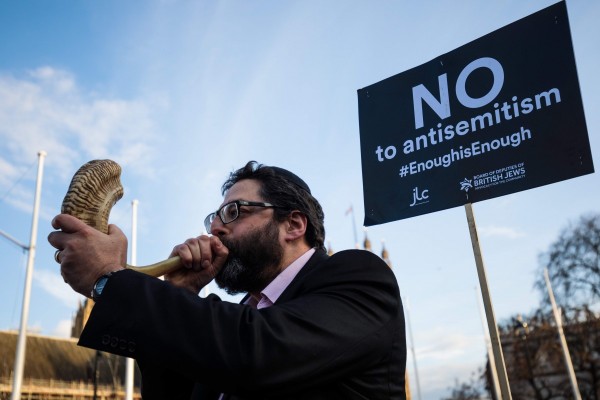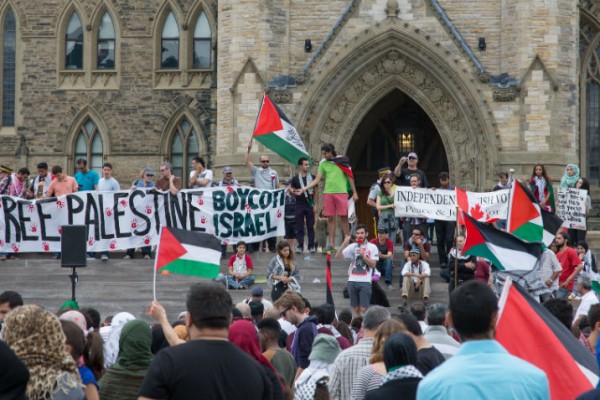The Jerusalem Declaration on Antisemitism: a viable way forward for anti-racist action
Progressives need the tools necessary to resist attacks on freedom of speech—as well as to provide a better alternative

The Jerusalem Declaration on Antisemitism accomplishes the task of clearly identifying antisemitism in such a fashion that it is unlikely to upset anyone, writes Taylor Noakes. Photo by Ted Eytan.
Shimon Koffler Fogel, President of the Centre for Israel and Jewish Affairs (CIJA), recently argued in the pages of the Toronto Star that antisemitism needs to be defined, and that the International Holocaust Remembrance Alliance’s (IHRA) working definition of antisemitism is best suited to help institutions, governments, publications—indeed, just about everybody—get a firm grasp on what antisemitism actually is.
I can agree with part of Koffler Fogel’s argument: there is indeed a need for a better understanding of antisemitism.
Antisemitism is on the rise across Canada, and this should be a concern for everyone, irrespective of their political orientation, religious beliefs, or personal opinions concerning the state of Israel or the policies of the current Israeli government.
This is not to denigrate or diminish any other form of hatred or racism. Indeed, hate of all forms is rising in Canada like in much of the rest of the Western world (antisemitic hatred is second only to anti-Black hatred as the most commonly reported hate types in Canada. Cases of both have been on the rise in recent years, with anti-Black hatred reported at rates that are roughly double those of antisemitic hatred).
Racism, among other kinds of hatred, is routinely reinforced by Canada’s mainstream press and members of Canada’s political and media elite, be it in the form of generalized Sinophobia, unfounded fears over irregular migration, diminishing Indigenous experience concerning residential schools, or various efforts to delegitimize Palestinian identity.
Antisemitism is a particular case of prevalent hatred in Canadian society, and for a few reasons.
To begin with, it is the hatred most Canadian political and media elites would like to believe they are best attuned to confront and oppose. But when it comes to some of the most glaring examples—including monuments to war criminals and SS units on Canadian soil, funding to help protect said monuments from ‘hate crimes,’ commemorations that have been described by historians as ‘soft Holocaust denial,’ and Deputy Prime Minister Chrystia Freeland’s embarrassing proclivity to be seen with the symbols and slogans of Second World War-era Nazi collaborators—Canada’s political and media elites have proven themselves woefully incapable of condemning the very real and most direct forms of antisemitism in our society today.
Not only are representatives of Canada’s major political parties failing to condemn monuments to Nazis in their own jurisdictions (believe me, I’ve asked them), Canada can’t even condemn Nazism at the United Nations (despite the fact that the majority of world nations have no such trouble).
Were this not troubling in and of itself, Holocaust revisionism bordering on overt denial can easily make its way into otherwise reputable newspapers, as journalist Jeremy Appel recently demonstrated for Canadian Dimension (I reached out to the Ottawa Citizens’ opinions editor, Christina Spencer, to find out how an article titled “Ottawa’s National Holocaust Monument must include Ukrainians” managed to be published in the first case, and whether it would be retracted. Spencer told me that the content of the article would be discussed in letters to the editor and a rebuttal).
Take it from a historian, there aren’t ‘two sides’ to the Holocaust.
The historical record is exceptionally clear: the Holocaust happened, it was the worst thing to happen during the 20th century, and stands with few equals as one of the very worst things to have ever happened in the entirety of human history. Denial of the Holocaust is already a foundational belief of the far-right throughout the Western world, but Holocaust revisionism—particularly on the matter of collaboration by Eastern European ultranationalists during the war—is becoming normalized by advocates of NATO expansion, self-described political moderates and centrists, and often historically illiterate employees of Canadian legacy media.
Adding to the problem of antisemitism in our society are the efforts by the current Israeli government, and their lobbyists and supporters amongst the Israeli diaspora community, to reframe valid criticism of the state of Israel, its policies and government, as antisemitism.
For the same reason that progressives should abstain from labelling everything we don’t like Hitler or fascism, the current Israeli government—and its supporters—are doing a disservice to the global Jewish community by advocating for the IHRA definition of antisemitism.
The reason is very simple. As a group of Palestinian and Arab academics put it in an open letter published by The Guardian in November of 2020, examples of antisemitism provided in the IHRA definition “…conflates Judaism with Zionism in assuming that all Jews are Zionists, and that the state of Israel in its current reality embodies the self-determination of all Jews.”
This is quite ironic: while the IHRA working definition specifically identifies “holding Jews collectively responsible for actions of the state of Israel” as something that could be rightfully considered antisemitic, it also presumes all Jews are Zionists, turning essentially any criticism of the state of Israel into an attack against all Jews.
Not only is the IHRA working definition too broad, it is so broad it can be used to silence essentially any legitimate criticism of the state of Israel as antisemitic. The application of the working definition, as noted by the Arab and Palestinian scholars mentioned above, has been used almost exclusively to silence progressive organizations and legitimate boycott initiatives. And that’s not wild speculation either: it is the chief concern of the very man who drafted the definition some years ago. Kenneth Stern, the American attorney who developed the IHRA working definition on antisemitism to better understand it and to help document it has stated “right-wing Jews are weaponizing it” to stifle legitimate criticism of Israel.
Take a moment to consider the IHRA working definition for yourself (and click this link to see the problematic examples).
“Antisemitism is a certain perception of Jews, which may be expressed as hatred toward Jews. Rhetorical and physical manifestations of antisemitism are directed toward Jewish or non-Jewish individuals and/or their property, toward Jewish community institutions and religious facilities.”
The IHRA definition is a mouthful, but more importantly it’s an oddly written mouthful that seems to be accomplishing exactly the opposite of the goal it set out to achieve: needlessly overcomplicating the definition of antisemitism. A ‘rhetorical manifestation of antisemitism’ directed at my non-Jewish dry-cleaning business would be peculiar and absurd and illogical. I don’t think it could reasonably be called hatred.
Some of the specific examples of antisemitism listed by the IHRA definition are difficult to perceive as anything other than an attempt to silence progressive criticism of the policies of contemporary Israeli governments. Take for instance “Denying the Jewish people their right to self-determination, e.g., by claiming that the existence of a State of Israel is a racist endeavor.” The latter part of this sentence has nothing to do with the former. Israel’s occupation of Palestine meets the definition of apartheid according to the United Nations. It means the government of Israel must change its policies, not that the Jewish people have no right to self-determination.
Knowing as we do that the IHRA working definition is being used to silence critics of Israel, it is imperative that progressives have the tools necessary to resist attacks on freedom of speech, thought and conscience, as well as to provide a better alternative. As it happens, there is a better definition of antisemitism, the Jerusalem Declaration on Antisemitism (JDA). Consider it:
Antisemitism is discrimination, prejudice, hostility or violence against Jews as Jews (or Jewish institutions as Jewish).
Not only is the definition far clearer, so too are the guidelines for its implementation. Better still, it has the approval of a considerable number of prominent Jewish academics as well, all of whom endorsed the Jerusalem Declaration for all the aforementioned problems with the IHRA definition. Best of all, whereas the IHRA definition is inherently divisive—among Jews, non-Jews, scholars, anti-racism activists, and so on—the Jerusalem Declaration accomplishes the task of clearly identifying antisemitism in such a fashion that it is unlikely to upset anyone. For institutions, organizations, associations, movements, and governments, it is far more effective and far less ambiguous.
The government of Israel has taken an unfortunate turn towards the hard right. Obviously, very few governments could ever claim to be truly representative of the people of a given nation, and Israel’s current government is absolutely not representative of mainstream Jewish thought or opinion, either in Israel or abroad. Much like with far-right movements of all kinds the world over, a small minority of voices have hijacked the conversation and insist their myopic worldview should dictate policy for everyone else. The IHRA working definition on antisemitism wasn’t conceived of in this way, but has unfortunately been put to use by opportunists—such as conservative provincial governments and a small number of university administrations—as a tool to regulate and control free speech. It must be resisted, and the JDA offers a unique tool to unambiguously reiterate the anti-racist foundation of the progressive Left.
The fight against hate has always been our fight first and foremost. We should therefore be leading the charge to define the terms.
Taylor C. Noakes is an independent journalist and public historian from Montréal. In addition to writing regularly for Canadian Dimension, he contributes to the Toronto Star, Jacobin, Cult MTL, The Maple, DeSmog, and the Montréal Review of Books, among others. He holds an MA in Public History from Duquesne University and has worked on the restoration of playwright August Wilson’s childhood home. He is also a frequent contributor to the Canadian Encyclopedia, and once debated several Canadian prime ministers at once on matters of foreign policy.










